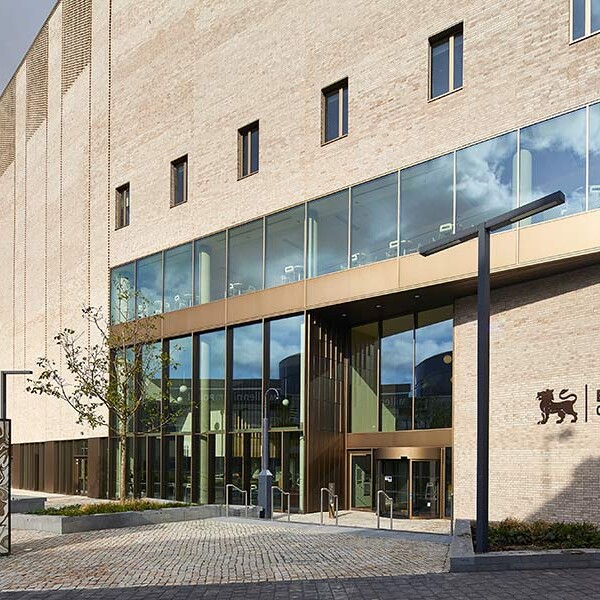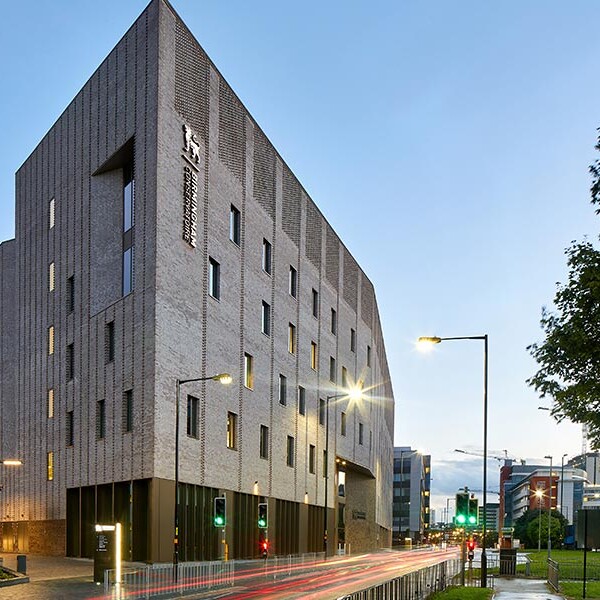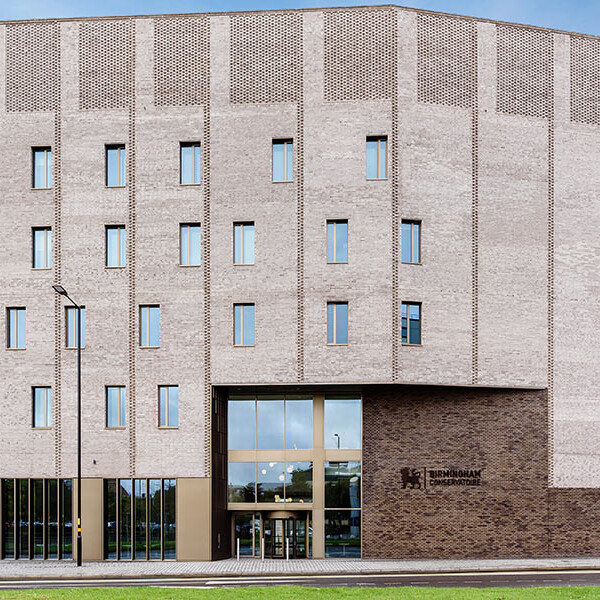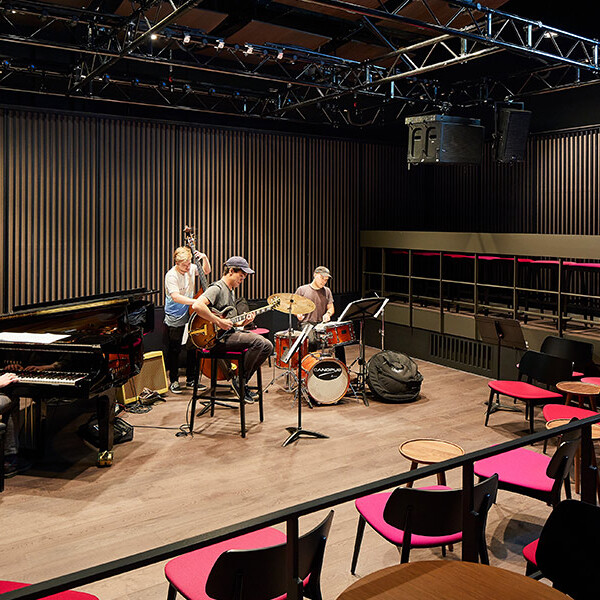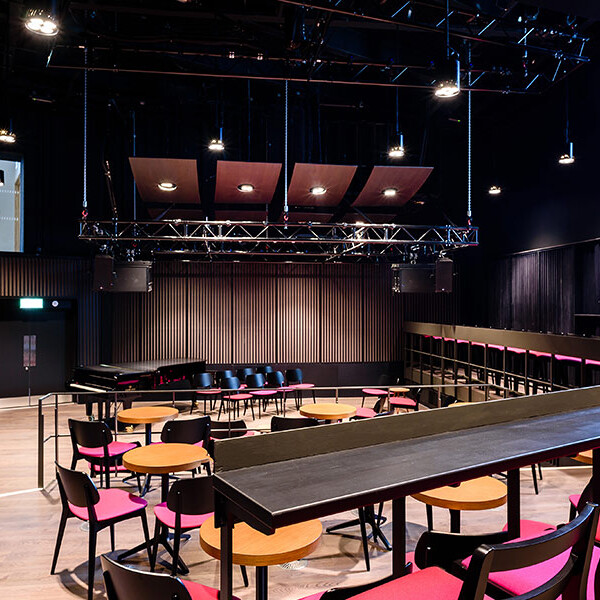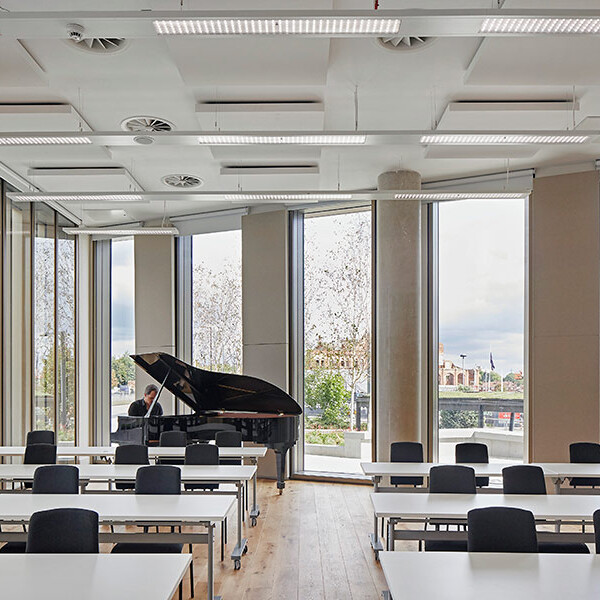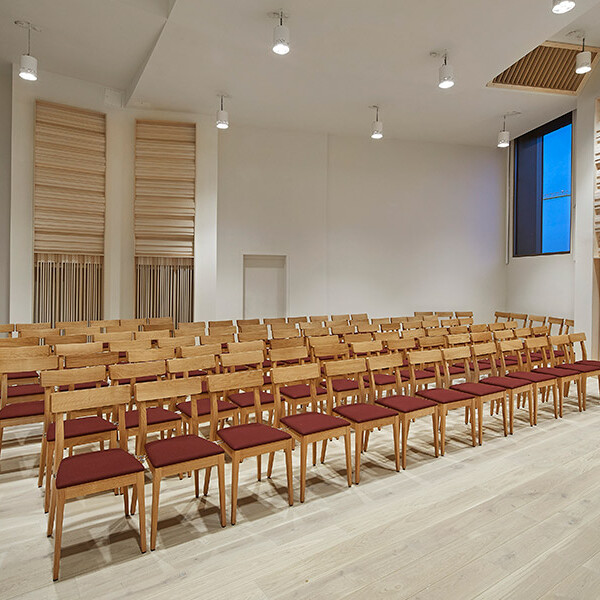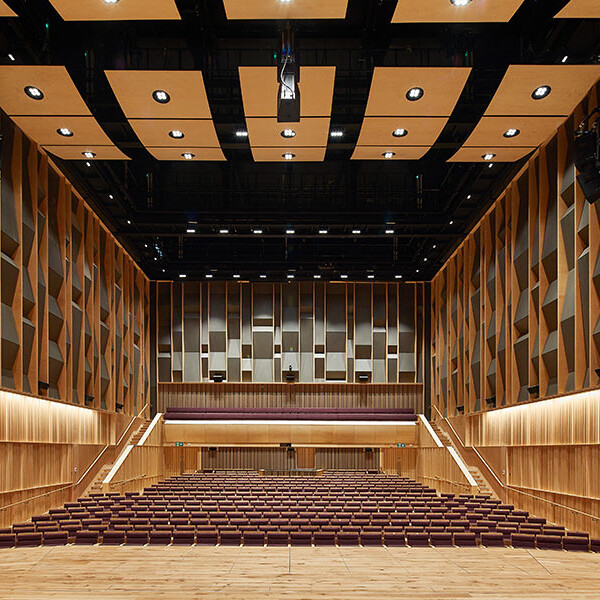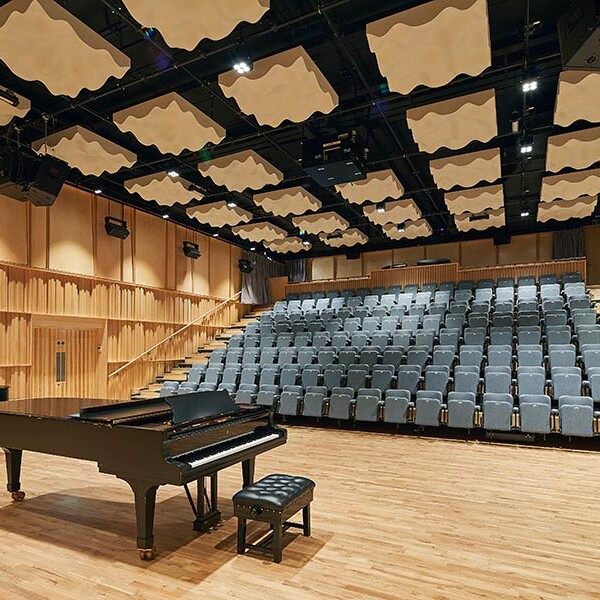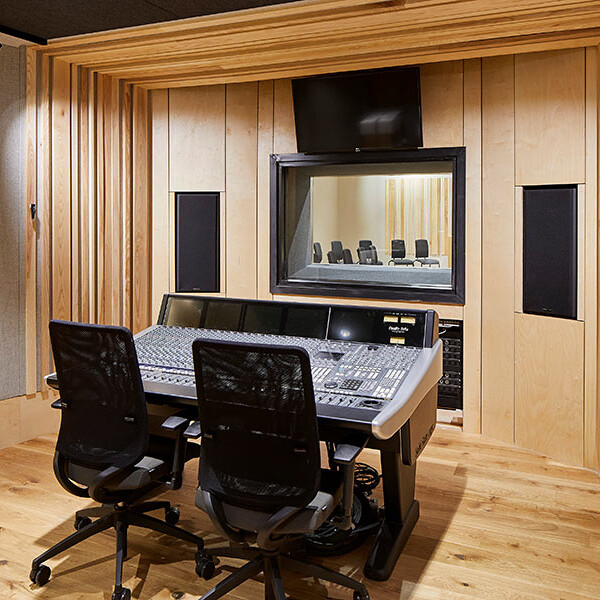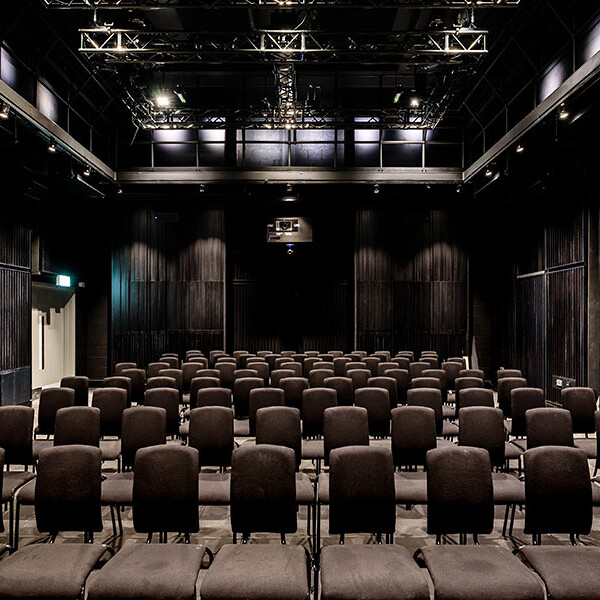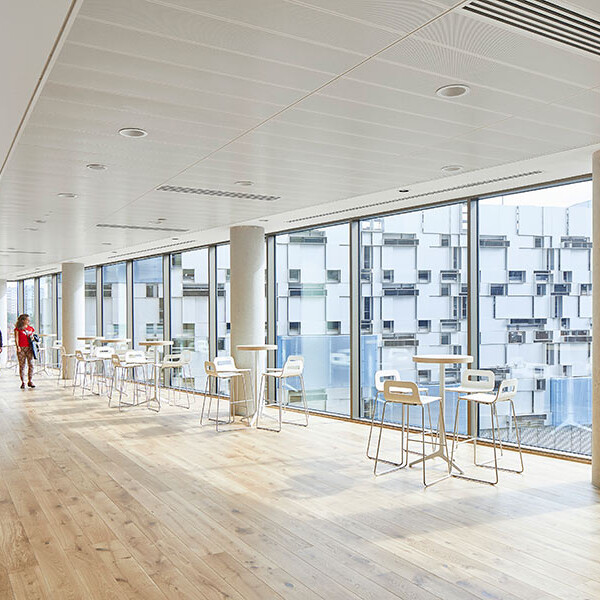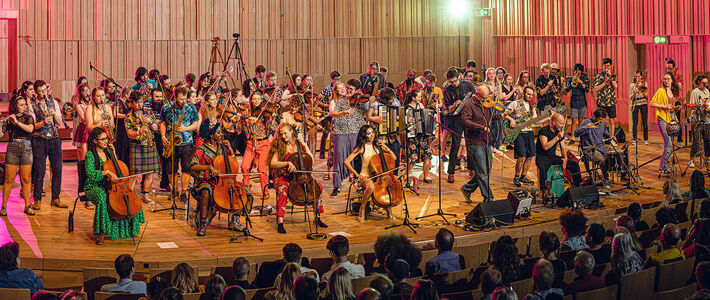
Music - MMus / PgCert / PgDip
Currently viewing course to start in 2025/26 Entry.
The principal aim of our Master of Music (MMus) course is to provide you with knowledge, skills, and confidence to succeed in your chosen branch(es) of the music profession, giving you a head-start in addressing the challenges involved in becoming a professional musician....
- Level Postgraduate Taught
- Study mode Full Time/Part Time
- Award MMus / PgCert / PgDip
- Start date September 2025
- Subject
- Location Royal Birmingham Conservatoire
This course is:
Open to International Students
Overview
The principal aim of our Master of Music (MMus) course is to provide you with knowledge, skills, and confidence to succeed in your chosen branch(es) of the music profession, giving you a head-start in addressing the challenges involved in becoming a professional musician.
The course is suitable for both recent graduates and suitably qualified mature students, with a range of support to ensure that you leave Royal Birmingham Conservatoire ready to pursue a musical career.
A distinctive feature of Royal Birmingham Conservatoire’s postgraduate provision is that it will give you the opportunity to make choices within your course directly relevant to your future career aspirations, both within your Principal Study area and in your supporting studies. All MMus and PgDip routes include a core Career Development module designed to get you thinking about your future professional plans, and a broad menu of optional Professional Development modules designed to help you work towards achieving your personal career aspirations. You will also take a core module designed to develop your skills as a researcher or informed practitioner.
You will have the opportunity to study in one of several Principal Study areas, most of which are also offered at PgDip or PgCert level.
We also offer the opportunity to study for an MMus via our 12-month route. To be eligible for this route, applicants must be able to show evidence of an extremely high level of achievement in the Principal Study area and a strong academic record at undergraduate level (or equivalent). If you are interested in the 12-month route, please email an initial enquiry about your potential eligibility to conservatoire.admissions@bcu.ac.uk as it is not possible to apply for this route via UCAS.
Instrumental Performance (MMus, PgDip, PgCert)
This specialism prepares you for a solo, chamber or orchestral career. It is available to students pursuing orchestral instruments, keyboard instruments and other solo instruments such as recorder, guitar, and saxophone, with a route also offered for bowed string and guitar ensembles. We also welcome instrumentalists and singers who are developing fusions of folk music with other genres, students wishing to focus on songwriting, and woodwind players who do not wish to follow the traditional orchestral route but would prefer to pursue a career as a multi-instrumentalist in musical theatre.
Read more about our instrumental departments:
Vocal Performance (MMus, PgDip, PgCert)
This route offers advanced-level training in singing. You're encouraged and enabled to increase your experience as a performer and to broaden your repertoire, though you can also take the opportunity to specialise if you wish. You'll enjoy regular opportunities to sing in a variety of contexts, both as a soloist and in ensembles with other performers. Read more about Vocal Performance.
Orchestral Performance (Strings) (MMus, PgDip)
Developed in partnership with the City of Birmingham Symphony Orchestra (CBSO), this route is for advanced level string players considering professional orchestral auditions and on the brink of a professional career. You will spend a significant amount of rehearsal time in the CBSO alongside one or more dedicated host players who will act as mentors. You may also be offered opportunities to play at the back of the section to gain further experience. In addition to developing your technical facility, musicianship, interpretative skills, and stylistic awareness, you will expand your knowledge of orchestral repertoire, learn how to prepare for rehearsal in the most efficient way, develop strategies which will help you to integrate within your section, and build confidence in preparing for orchestral auditions. Read more about our Strings department.
Please note, there will be a maximum of one Orchestral Performance student in each CBSO string section in any given year, so please email Conservatoire.Admissions@bcu.ac.uk to check availability of places before applying.
Conducting (MMus, PgDip)
We offer the following:
All our conducting pathways offer the technical training, collaborative opportunities, and podium time necessary to help you prepare for a career as a professional conductor. You will spend considerable time developing your directing techniques in rehearsals and will also have opportunities to demonstrate your skills in performance. In addition to attending and participating in scheduled ensemble activities, you will be encouraged to explore other opportunities to engage as conductor or observer. Students across all three pathways will also attend classes/workshops of their peers studying other conducting specialisms.
Jazz (MMus, PgDip, PgCert)
Designed for recent graduates and suitably qualified mature students, these programmes provide high quality advanced-level tuition, enabling you to specialise either as a Jazz performer or instigator. You will benefit from regular individual specialist tuition from professional jazz musicians active on today’s scene. There will be an emphasis on the art of improvisation as well as regular opportunities to rehearse and perform with small and large jazz ensembles. Read more about Jazz.
Experimental Performance (MMus, PgDip, PgCert)
Designed for emerging arts practitioners, this route provides you with a unique opportunity to undertake independent artistic projects in a fully supportive environment. Practitioners from a variety of disciplines (including, but not limited to, instrumental/vocal performance, composition, dance, choreography, theatre, visual and performance art, and creative writing) come together with likeminded people. The core of your study will be formed by your own artistic ideas, which are developed, through research and dialogue, into professional practical projects. Read more about Experimental Performance.
Composition (MMus, PgDip, PgCert)
Our composition route actively celebrates the diversity of today's musical genres, and fosters artists who challenge, innovate, and transform notions of artistic practice today. You'll spend most of your time writing music for professional and student ensembles, whether you choose to respond to our set briefs or work on your own projects. You'll be encouraged to express yourself in multiple musical and artistic genres. By studying composition within a thriving conservatoire setting, you'll have excellent opportunities to collaborate with performers and to have your works performed. Read more about our Composition department.
Music Technology (MMus, PgDip, PgCert)
This pathway offers an exciting opportunity for composers and composer-performers to experiment with and develop expertise in the creative application of established and new music technologies.
You will be based in our £57-million Conservatoire building, which features our Concert Hall, 150-seat Recital Hall, more than 70 practice rooms, ensemble rooms and workshops, seven recording studios, editing, and mastering suites, and our black-box performance space known as The Lab. All our spaces are acoustically designed to provide a world-class music-making environment.
We also benefit from being part of Birmingham City University’s Faculty of Arts, Design and Media, which provides many opportunities for collaboration and interdisciplinary projects. Read more about Music Technology.
What's covered in this course?
- Regular individual tuition in your Principal Study area from leading UK and internationally renowned performers, practitioners, teachers, and researchers.
- Bespoke support classes in musicianship and repertoire.
- The opportunity to participate in a wide variety of creative projects, including interdisciplinary collaborations.
- Frequent opportunities to perform, both within Departmental activities and in concerts.
- Access to forums, seminars and masterclasses with distinguished visiting artists, composers, and performers.
- Access to the Conservatoire’s broad range of ensemble activities, including chamber music, operatic productions, Brass Band, Wind Orchestra, Symphony Orchestra, ‘Repertoire’ and ‘Pops’ Orchestras, Thallein (Contemporary Music) Ensemble, and the Folk Ensemble.
- The opportunity to tailor your course to your individual needs through wide-ranging Professional Development modules.
- A chance to network with leading professionals from around the world.
The MMus course at RBC has been an invaluable and pivotal step in my journey as a composer and an artist — providing a supportive and nurturing environment in which to experiment with new ideas, and expose myself to unfamiliar and challenging concepts.
The music community at RBC is incredibly tight-knit, with a plethora of opportunities for collaborations with both professional and world-leading ensembles. The individualised focus of the course and the artistic development I received is something I’ll be eternally grateful for.
Zygmund De Somogyi, organiser of Prxludes
Through the flexibility of the curricula and the huge variety of opportunities for collaboration with peers from every department, I’ve grown as a musician in more ways than I ever expected.
I’ve had amazing experiences: conducting and running the Camerata; accompanying and playing continuo in the Historical Performance department; composing for Conservatoire ensembles; playing and conducting contemporary music; even playing in the legendary Conservatoire Folk Ensemble!
Isaac Boulter, MMus Alumnus
Open Day
Join us on campus where you'll be able to explore our facilities and accommodation in person, and chat to staff and students from the Royal Birmingham Conservatoire.
Next Open Day: 12 June 2025
Entry Requirements
Essential requirements
UK students should normally hold an honours degree, ideally but not necessarily in Music.
Non-UK students should hold a Bachelor's degree or a similar degree-equivalent diploma, ideally but not necessarily in Music.
Applicants for most Principal Study areas will be auditioned live, but some will require you to submit a portfolio in addition to or instead of a live audition/interview. For full audition requirements and audition advice, please visit the Music Auditions section of the Conservatoire website.
Applying with international qualifications
See below for further information on applying as an international student.
If you have a qualification that is not listed, please contact us.
Fees & How to Apply
UK students
Annual and modular tuition fees shown are applicable to the first year of study. The University reserves the right to increase fees for subsequent years of study in line with increases in inflation (capped at 5%) or to reflect changes in Government funding policies or changes agreed by Parliament. View fees for continuing students.
Award: MMus
Starting: Sep 2025
- Mode
- Duration
- Fees
- Full Time
- 2 years
-
TBC
- Apply via UCAS
- Part Time
- 3 years*
-
TBC
- Apply via UCAS
Award: PgCert
Starting: Sep 2025
- Mode
- Duration
- Fees
- Part Time
- 1 year*
-
TBC
- Apply via UCAS
Award: PgDip
Starting: Sep 2025
- Mode
- Duration
- Fees
- Full Time
- 1 year
-
TBC
- Apply via UCAS
- Part Time
- 2 years*
-
TBC
- Apply via UCAS
International students
Annual and modular tuition fees shown are applicable to the first year of study. The University reserves the right to increase fees for subsequent years of study in line with increases in inflation (capped at 5%) or to reflect changes in Government funding policies or changes agreed by Parliament. View fees for continuing students.
Award: MMus
Starting: Sep 2025
- Mode
- Duration
- Fees
- Full Time
- 2 years
-
TBC
- Apply via UCAS
Award: PgDip
Starting: Sep 2025
- Mode
- Duration
- Fees
- Full Time
- 1 year
-
TBC
- Apply via UCAS
Applications are still open for September 2025. Apply now
*Part-time fees
Your fees are charged per 20 credits, depending on the number of credits studied in each year. The fee table above outlines recommended credit loads in each year; if you choose to study a different credit load, please be aware that your fees will be charged accordingly.
Completing your application
Further information on writing your personal statement can be found on the UCAS Conservatoires website.
International postgraduate scholarships available worth up to £33,500
Two scholarships from the Allan & Nesta Ferguson Charitable Trust, each worth up to £33,500 (to cover tuition fees and stipend), are available for students from Africa, India or South America undertaking a 12-month programme of postgraduate study.
Course in Depth
MMus
In order to complete this course you must successfully complete THREE CORE modules (totalling 140 credits):
- The Career Development module (20 credits), and
- Both Principal Study 1 and 2 modules (each 60 credits, chosen according to the specialism – see below).
Members of the music profession require not only high-level specialist skills but also the ability to target those skills strategically to different circumstances. This module focuses on a range of different aspects of a musician’s professional development that directly relate to the music industry and their preparation for it: from self-promotion and self-management, to funding and wellbeing. It is thus central to a programme which aims to prepare you for a career as a musician in the 21st century.
It requires you, near the beginning of your postgraduate studies, to reflect ambitiously yet realistically on your professional aspirations, and to formulate a plan that helps you stand the best chance of achieving your goals. Weekly workshops, delivered by internal staff and external professionals, will focus on the practicalities of a career in music, providing you with a better insight into the industry you will be entering, as well as encouraging you to be self-reflective about your own personal and professional development needs.
You must complete one of the Principal Study modules below (Principal Study areas chosen will be dependent upon the specialist pathway chosen by the student):
As a postgraduate instrumentalist or singer, the Principal Study 1: Instrumental/Vocal Performance module enables you to advance your training in your specialist area and it is thus at the heart of your conservatoire studies.
As the focus of this module is entirely on your own continued development as a performer, you will spend considerable time developing your technical facility, musicianship, interpretative skills and stylistic awareness, expanding your knowledge of the repertoire, refining your platform manner and presentation skills, and, in some cases, advancing your collaborative performance skills. Students taking the Global Traditional Music Performance specialism will be encouraged to form bands or ensembles appropriate to their specialist area of music.
Your work in this module is supported by one-to-one tuition and a variety of related activities in your Principal Study area, including performance classes, masterclasses and department-specific workshops (e.g. languages and movement for singers, reed-making for wind players, and so on). You will necessarily devote a considerable amount of time to individual practice.
As a postgraduate percussionist, the Principal Study 1: Percussion module enables you to advance your training in your specialist area. As the focus of this module is entirely on your own continued development as a performer, you will spend considerable time developing your technical facility, musicianship, interpretative skills and stylistic awareness, expanding your knowledge of the repertoire, refining your platform manner, presentation and organisational skills (i.e. including percussion set-up) and, in some cases, advancing your collaborative performance skills.
As a postgraduate instrumentalist, singer or singer-songwriter working in world and/or folk music traditions, the Principal Study 1: Global Traditional Music Performance module enables you to advance your training in your specialist area and it is thus at the heart of your conservatoire studies. Since the focus of this module is entirely on your own continued development as a performer, you will spend considerable time developing skills relating to your particular specialism, for example, technical facility, musicianship and interpretative skills, furthering your skills in transcription, composition, arranging and songwriting, and leading your own ensemble/band. You may choose to study a single traditional music in-depth or develop your own fusion that includes elements of folk/world/traditional music as well as other genres.
As a postgraduate string player following our Orchestral Performance pathway at postgraduate level, the Principal Study 1: Orchestral Performance module enables you to advance your training in your specialist area. As the focus of this module is entirely on your own continued development as an orchestral string player, you will spend a significant amount of rehearsal time with the CBSO alongside one or more dedicated host players who will act as mentors, as well as opportunities to play at the back of the section. In addition to developing your technical facility, musicianship, interpretative skills and stylistic awareness, you will expand your knowledge of orchestral repertoire, learn how to prepare for rehearsal in the most efficient way, develop strategies which will help you to integrate within your section, both musically (in terms of blend, intonation and so on) and socially, and build confidence in preparing for orchestral auditions.
As a postgraduate choral conductor, the Principal Study 1: Choral Conducting module enables you to advance your training in your specialist area. As the focus of this module is entirely on your own continued development as a choral conductor, you will spend considerable time developing not only conducting and gestural techniques in rehearsal and in performance, but also skills in administration, management (including self-management, management of other people individually and in a group, and of rehearsal and performance situations), communication (including interpersonal skills), interpretation and musicianship (aural skills, score reading, sight reading, ability to sing to demonstrate), and ability to mould voices into a cohesive group.
Your work in this module is supported by one-to-one tuition in choral conducting and a variety of related activities in the Principal Study area. These will normally include taking weekly rehearsals of the Conservatoire’s second chamber choir, Camerata; a weekly support class focusing on both developing musicianship skills and enhancing knowledge of the repertoire; masterclasses from visiting experts; seminars on choral conducting issues; and some 1:1 vocal tuition. You should also expect to attend classes/workshops of your peers studying orchestral conducting. You will be encouraged to take part in other vocal/choral activities scheduled within the Conservatoire (and elsewhere), and to engage in language provision provided by the Department of Vocal and Operatic Studies. You are also encouraged to form your own groups, to participate in external groups and to find external choirs to conduct. Chorus master/assistant conductor possibilities may also arise in the context of the Conservatoire operas and Chorus.
As a postgraduate orchestral conductor, the Principal Study 1: Orchestral Conducting module enables you to advance your training in your specialist area. As the focus of this module is entirely on your own continued development as an orchestral conductor, you will spend considerable time developing conducting techniques in rehearsal and in performance, rehearsal management techniques, musicianship skills, score reading skills, programming skills, stylistic awareness and approaches to interpretation.
‘Orchestra’ here should be understood in the widest sense, since your experience (and assessment) is likely to involve a variety of the ensembles which make up the Conservatoire’s Performance Department (e.g. Symphony Orchestra, Wind Orchestra; Thallein Contemporary Music Ensemble).
As a postgraduate brass band conductor, the Principal Study 1: Brass Band Conducting module enables you to advance your training in your specialist area. As the focus of this module is entirely on your own continued development as a brass band conductor, you will spend considerable time developing conducting techniques in rehearsal and in performance, rehearsal management techniques, musicianship skills, score reading skills, programming skills, stylistic awareness and approaches to interpretation.
‘Brass Band’ here should be understood in a wider sense, since your experience (and assessment) is likely to also involve smaller ensembles within the Conservatoire’s Brass Department.
As a postgraduate Jazz student, the Principal Study 1: Jazz Performance module enables you to advance your training in your specialist area.
As the focus of this module is entirely on your own continued development as a jazz performer, you will spend considerable time not only developing your technique alongside your musicianship and improvisation skills, but also expanding your knowledge of the tradition and advancing your experience as a collaborative performer and leader.
Your work in this module is supported by one-to-one tuition and a variety of related activities in the Jazz Department and wider Conservatoire, including weekly performance platforms, termly performance platform festivals, masterclasses (led by guest international artists) and workshops by touring bands, as well as a number of special events throughout the year, for example the Thelonious Monk Festival (Monkathon), the Cheltenham International Jazz Festival, and regular collaborations with our partners in Paris, Berlin and Siena.
As a postgraduate Jazz student, the Principal Study 1: Jazz Instigator module enables you to advance your training in your specialist area.
As the focus of this module is entirely on your development as an instigator in the context of jazz performance, you will spend considerable time not only on developing your own playing, but also advancing your leadership and directing skills and your mentoring and coaching abilities. You will work on your rehearsal technique and stagecraft, and gain experience of working autonomously. You will additionally enhance your own specialist knowledge and your research skills.
Your work in this module is supported by one-to-one tuition and mentoring. A number of one-to-one hours can be allocated to teachers and mentors from outside the Jazz Department, for example with Classical composers, promotors, band leaders, artists, and researchers from within the faculty. You will have regular contact with promoters of jazz and the creative arts.
This module enables you as a postgraduate composer to advance your training in your specialist area. For MMus students, it provides a prelude to the further advancement of your training in the Principal Study 2: Composition module.
Given that this module is focused entirely on your continued growth as a composer, it will focus on developing both your practical skills (such as approaches to expressing an idea/concept, instrumentation, voice leading, use of rhythm, melody and harmony, and presentation) and your critical/intellectual skills (such as creative thinking, aesthetic awareness and self-reflective working).
This module enables you, as a postgraduate Music Technologist, to advance your training in your specialist area. For MMus students, it provides a prelude to the further advancement of your training in the Principal Study 2: Music Technology module.
This module is focused entirely on your continued growth as a Creative Music Technologist. The skills developed will be specific to your own interests, but are likely to include a combination of composition utilising technology, performing with technology, interactive music technology, programming, recording, production, mixing and mastering.
As an experimental performer, this module enables you to advance your training in your specialist area. For MMus students, it provides a prelude to the further advancement of your training in the Principal Study 2: Experimental Performance module.
Given that this module is focused entirely on your continued growth as an experimental performer, it will focus on developing such aspects as follows: the realization of ideas and concepts, creative thinking, critical approach to art making, the use of space and structure, interdisciplinary collaboration, self-reflective working, aesthetic awareness and aspects of presentation, including the use of relevant technology.
You must complete one of the Principal Study modules below (Principal Study areas chosen will be dependent upon the specialist pathway chosen by the student):
As a postgraduate instrumentalist or singer, the Principal Study 1: Instrumental/Vocal Performance module enables you to advance your training in your specialist area and it is thus at the heart of your conservatoire studies. As the focus of this module is entirely on your own continued development as a performer, you will spend considerable time developing your technical facility, musicianship, interpretative skills and stylistic awareness, expanding your knowledge of the repertoire, refining your platform manner and presentation skills, and, in some cases, advancing your collaborative performance skills.
Your work in this module is supported by one-to-one tuition and a variety of related activities in your Principal Study area, including performance classes, masterclasses and department-specific workshops (e.g. languages and movement for singers, reed-making for wind players, and so on). You will necessarily devote a considerable amount of time to individual practice.
As a postgraduate percussionist, the Principal Study 2: Percussion module builds on the performance skills acquired in the Principal Study 1 module, encouraging independent decision-making, the development of an individual musical personality, and a professional approach to the performance context. The module clearly supports you in adopting an ever-increasing degree of professionalism in all aspects. You will continue to advance your technical facility, musicianship and interpretative skills; to further enhance, through research, your stylistic awareness and knowledge of the repertoire; to develop expertise in programming and build stamina. The assessments will enhance your awareness of what is required of a professional performer in the chosen context.
As a postgraduate instrumentalist, singer or singer-songwriter working in world and/or folk music traditions, the Principal Study 2: Global Traditional Music Performance module builds on the performance skills acquired in the Principal Study Project 1 module, encouraging independent decision-making, the development of an individual musical personality, and a professional approach to the performance context. The module clearly supports you in adopting an ever-increasing degree of professionalism in all aspects. You will continue to advance your technical facility, musicianship and interpretative skills alongside enhanced skills in transcription, composition, arranging, song writing and ensemble/band leadership. You may choose to study a single traditional music in-depth or develop your own fusion that includes elements of folk/world/traditional music as well as other genres. Furthermore, you will develop expertise in programming and build stamina. The assessments will enhance your awareness of what is required of a professional performer in the chosen context.
As a postgraduate string player following our Orchestral Performance pathway at postgraduate level, the Principal Study 2: Orchestral Performance module builds on the performance skills acquired in the Principal Study Project 1 module. The focus of this module is entirely on your own continued development as an orchestral string player, and especially on developing your capacity to develop your own playing within the orchestral context. The module clearly supports you in adopting an ever- increasing degree of professionalism in all aspects. Further experience within the CBSO will lead not only to the enhancement of your individual playing skills but to greater confidence in developing your own playing within the orchestra and a fuller awareness of the professional context. You will continue to advance your technical facility, musicianship and interpretative skills, and to further enhance, through research, your stylistic awareness and knowledge of the repertoire. A sound knowledge of standard orchestral repertoire in particular, familiarity with the typical orchestral audition process and experience of playing within a professional orchestra are all likely to improve your chances of progression into the profession.
As a postgraduate brass band conductor, the Principal Study 2: Brass Band Conducting module builds on the skills acquired in the Principal Study 1 module, encouraging independent and appropriate decision-making based on secure musicianship skills and self-reflection, the development of an individual musical personality, and a professional approach to rehearsal and performance, including effective leadership and communication skills. The module clearly provides professionally-relevant experience and you will spend considerable time further developing conducting techniques in rehearsal and in performance, rehearsal management techniques, musicianship skills, score reading skills, programming skills, stylistic awareness and approaches to interpretation.
‘Brass Band’ here should be understood in a wider sense, since your experience (and assessment) is likely to also involve smaller ensembles within the Conservatoire’s Brass Department.
As a postgraduate choral conductor, the Principal Study 2: Choral Conducting module builds on the skills acquired in the Principal Study Project 1 module, encouraging independent and appropriate decision-making based on secure musicianship skills and self-reflection, the development of an individual musical personality, and a professional approach to rehearsal and performance, including effective leadership and communication skills. The module clearly provides professionally-relevant experience, and you will spend considerable time further developing not only conducting and gestural techniques in rehearsal and in performance, but also skills in administration, management (including self-management, management of other people individually and in a group, and of rehearsal and performance situations), communication (including interpersonal skills), interpretation and musicianship (aural skills, score reading, sight reading, ability to sing to demonstrate), and ability to mould voices into a cohesive group.
Your work in this module is supported by one-to-one tuition in choral conducting and a variety of related activities in the Principal Study area. These will normally include: taking weekly rehearsals of the Conservatoire’s second chamber choir, Camerata; a weekly support class focusing on both developing musicianship skills and enhancing knowledge of the repertoire; masterclasses from visiting experts; seminars on choral conducting issues; and some 1:1 vocal tuition. You should also expect to attend classes/workshops of your peers studying orchestral conducting. You will be encouraged to take part in other vocal/choral activities scheduled within the Conservatoire (and elsewhere), and to engage in language provision provided by the Department of Vocal and Operatic Studies. You are also encouraged to form your own groups, to participate in external groups and to find external choirs to conduct. Chorus master/assistant conductor possibilities may also arise in the context of the Conservatoire operas and Chorus.
As a postgraduate orchestral conductor, the Principal Study 2: Orchestral Conducting module builds on the skills acquired in the Principal Study 1 module, encouraging independent and appropriate decision-making based on secure musicianship skills and self-reflection, the development of an individual musical personality, and a professional approach to rehearsal and performance, including effective leadership and communication skills. The module clearly provides professionally-relevant experience and you will spend considerable time further developing conducting techniques in rehearsal and in performance, rehearsal management techniques, musicianship skills, score reading skills, programming skills, stylistic awareness and approaches to interpretation.
‘Orchestra’ here should be understood in the widest sense, since your experience (and assessment) is likely to involve a variety of the ensembles which make up the Conservatoire’s Performance Department (e.g. Symphony Orchestra, Wind Orchestra; Thallein Contemporary Music Ensemble).
Principal Study 2: Jazz Instigator
For a postgraduate Jazz student, the Principal Study Project 2: Jazz Instigator module builds on the groundwork of the Principal Study 1: Jazz Instigator or the Principal Study 1: Jazz Performance module. It demands not only a high level of performance skills, but also encourages independent decision-making in relation to the student’s own project, the development of an individual artistic concept, and an awareness of the contemporary jazz market (i.e. the professional context). The module clearly provides professionally-relevant experience for the intending jazz instigator.
Indeed, the focus of this module is entirely on your continued growth in this role. It will thus be concerned with the further development not only of your own skills as a performer, but also as a leader, director, mentor and coach. You will continue to hone your rehearsal technique and stagecraft, and to gain further experience of working autonomously. You will continue to expand your own specialist knowledge and to exercise your research skills.
OR
Principal Study 2: Jazz Performance
For a postgraduate Jazz student, the Principal Study 2: Jazz Performance module builds on the technical, musical and improvisation skills acquired in the Principal Study 1: Jazz Performance or Jazz Instigator module, encouraging a greater sophistication of approach, independent decision-making in relation to the music-making, and the emergence of an individual ‘voice’. The module clearly provides professionally-relevant experience for the intending jazz musician.
The focus of this module is entirely on your continued growth in this field. It will thus be concerned with the continued development of your technical, musicianship and improvisation skills, your knowledge of the tradition and your experience as a collaborative performer and leader. In addition, it will encourage you to develop your own original sound and concept, and enable you to enhance your musical communication and interaction in the ensemble setting.
As an experimental performer, this module enables you to continue to advance your training in your specialist area and thus provides professionally-relevant experience. It builds on the technical and creative skills acquired in the Principal Study 1 Experimental Performance module, encouraging greater ambition, the development of an individual voice and personal aesthetic, and a consistently professional approach to presentation.
In addition to continuing to develop the practical and critical skills fostered in Principal Study 1 Experimental Performance, it will seek to enhance your ability to deal with more ambitious ideas/concepts/projects (including the creation of large structures), and to be reflective, especially in how you write about and discuss your own work.
This module enables you as a postgraduate composer to continue to advance your training in your specialist area, and thus provides professionally-relevant experience. It builds on the technical and creative skills acquired in the Principal Study 1 Composition module, encouraging greater compositional ambition, the development of an individual voice and personal aesthetic, and a consistently professional approach to presentation.
In addition to continuing to develop the practical and critical skills fostered in Principal Study 1 Composition, it will seek to enhance your ability to deal with more ambitious ideas/concepts (including the creation of large structures), and to be reflective, especially in how you write about and discuss your own work.
This module enables you, as a postgraduate Music Technologist, to continue to advance your training in your specialist area, and thus provides professionally-relevant experience. It builds on the technical and creative skills acquired in the Principal Study 1: Music Technology module, encouraging a greater maturity of approach, the development of an individual voice and personal aesthetic, and a consistently professional approach to presentation.
This module is focused entirely on your continued growth as a Creative Music Technologist. The skills developed will be specific to your own interests, but are likely to include a combination of composition utilising technology, performing with technology, interactive music technology, programming, recording, production, mixing and mastering.
In order to complete this course, you must also successfully complete at least 100 credits from the following indicative list of OPTIONAL modules:
-
THREE Professional Development modules (20 credits each), and
-
ONE MMus optional module (40 credits)
- Concepts in Musicology
- Contemporary Music Concepts and Practice
- Music Technology in Performance
- Critical Editing Techniques
- Documentation
- Experimental Performance in Context(s)
- Historical Instrument Performance
- Historical Performance Practice
- Independent Scholarship in Music
- Music and Ideas
- Music Technology in Context
- Orchestration
- Performing and Producing in the Studio
- Professional Music Criticism
- Self-Promotion Project
- Teaching Matters: Principles and Practice
- Work Placement
- Writing Music for Media
- Conference Paper
- Preparation for Research
- Music, Community and Wellbeing (BMus module)
- Art and Ecologies
- Contemporary Philosophy and Aesthetics
- Discourses in Art and Design
- Models and Methods of Curatorial Practice
- Queer Strategies in Practice
- Small Arts Business Set Up
- Social Practice in the Visual Arts
- Live Events and Festival Management
- Social Media as Culture and Practice
- Research Project
- Critical Edition
- Lecture-Recital
- The Reflective Practitioner - there are two pathways through this module:
- Professional Placement, and
- Creative Interdisciplinary Artist.
Core modules are guaranteed to run. Optional modules will vary from year to year and the published list is indicative only.
PG Dip
In order to complete this course you must successfully complete TWO CORE modules (totalling 80 credits):
- The Career Development module (20 credits), and
- Principal Study 1 module (60 credits, chosen according to the specialism – see below).
Members of the music profession require not only high-level specialist skills but also the ability to target those skills strategically to different circumstances. This module focuses on a range of different aspects of a musician’s professional development that directly relate to the music industry and their preparation for it: from self-promotion and self-management, to funding and wellbeing. It is thus central to a programme which aims to prepare you for a career as a musician in the 21st century.
It requires you, near the beginning of your postgraduate studies, to reflect ambitiously yet realistically on your professional aspirations, and to formulate a plan that helps you stand the best chance of achieving your goals. Weekly workshops, delivered by internal staff and external professionals, will focus on the practicalities of a career in music, providing you with a better insight into the industry you will be entering, as well as encouraging you to be self-reflective about your own personal and professional development needs.
You must complete one of the Principal Study modules below (Principal Study areas chosen will be dependent upon the specialist pathway chosen by the student):
As a postgraduate instrumentalist or singer, the Principal Study 1: Instrumental/Vocal Performance module enables you to advance your training in your specialist area and it is thus at the heart of your conservatoire studies.
As the focus of this module is entirely on your own continued development as a performer, you will spend considerable time developing your technical facility, musicianship, interpretative skills and stylistic awareness, expanding your knowledge of the repertoire, refining your platform manner and presentation skills, and, in some cases, advancing your collaborative performance skills. Students taking the Global Traditional Music Performance specialism will be encouraged to form bands or ensembles appropriate to their specialist area of music.
Your work in this module is supported by one-to-one tuition and a variety of related activities in your Principal Study area, including performance classes, masterclasses and department-specific workshops (e.g. languages and movement for singers, reed-making for wind players, and so on). You will necessarily devote a considerable amount of time to individual practice.
As a postgraduate percussionist, the Principal Study 1: Percussion module enables you to advance your training in your specialist area. As the focus of this module is entirely on your own continued development as a performer, you will spend considerable time developing your technical facility, musicianship, interpretative skills and stylistic awareness, expanding your knowledge of the repertoire, refining your platform manner, presentation and organisational skills (i.e. including percussion set-up) and, in some cases, advancing your collaborative performance skills.
As a postgraduate instrumentalist, singer or singer-songwriter working in world and/or folk music traditions, the Principal Study 1: Global Traditional Music Performance module enables you to advance your training in your specialist area and it is thus at the heart of your conservatoire studies. Since the focus of this module is entirely on your own continued development as a performer, you will spend considerable time developing skills relating to your particular specialism, for example, technical facility, musicianship and interpretative skills, furthering your skills in transcription, composition, arranging and songwriting, and leading your own ensemble/band. You may choose to study a single traditional music in-depth or develop your own fusion that includes elements of folk/world/traditional music as well as other genres.
As a postgraduate string player following our Orchestral Performance pathway at postgraduate level, the Principal Study 1: Orchestral Performance module enables you to advance your training in your specialist area. As the focus of this module is entirely on your own continued development as an orchestral string player, you will spend a significant amount of rehearsal time with the CBSO alongside one or more dedicated host players who will act as mentors, as well as opportunities to play at the back of the section. In addition to developing your technical facility, musicianship, interpretative skills and stylistic awareness, you will expand your knowledge of orchestral repertoire, learn how to prepare for rehearsal in the most efficient way, develop strategies which will help you to integrate within your section, both musically (in terms of blend, intonation and so on) and socially, and build confidence in preparing for orchestral auditions.
As a postgraduate choral conductor, the Principal Study 1: Choral Conducting module enables you to advance your training in your specialist area. As the focus of this module is entirely on your own continued development as a choral conductor, you will spend considerable time developing not only conducting and gestural techniques in rehearsal and in performance, but also skills in administration, management (including self-management, management of other people individually and in a group, and of rehearsal and performance situations), communication (including interpersonal skills), interpretation and musicianship (aural skills, score reading, sight reading, ability to sing to demonstrate), and ability to mould voices into a cohesive group.
Your work in this module is supported by one-to-one tuition in choral conducting and a variety of related activities in the Principal Study area. These will normally include taking weekly rehearsals of the Conservatoire’s second chamber choir, Camerata; a weekly support class focusing on both developing musicianship skills and enhancing knowledge of the repertoire; masterclasses from visiting experts; seminars on choral conducting issues; and some 1:1 vocal tuition. You should also expect to attend classes/workshops of your peers studying orchestral conducting. You will be encouraged to take part in other vocal/choral activities scheduled within the Conservatoire (and elsewhere), and to engage in language provision provided by the Department of Vocal and Operatic Studies. You are also encouraged to form your own groups, to participate in external groups and to find external choirs to conduct. Chorus master/assistant conductor possibilities may also arise in the context of the Conservatoire operas and Chorus.
As a postgraduate orchestral conductor, the Principal Study 1: Orchestral Conducting module enables you to advance your training in your specialist area. As the focus of this module is entirely on your own continued development as an orchestral conductor, you will spend considerable time developing conducting techniques in rehearsal and in performance, rehearsal management techniques, musicianship skills, score reading skills, programming skills, stylistic awareness and approaches to interpretation.
‘Orchestra’ here should be understood in the widest sense, since your experience (and assessment) is likely to involve a variety of the ensembles which make up the Conservatoire’s Performance Department (e.g. Symphony Orchestra, Wind Orchestra; Thallein Contemporary Music Ensemble).
As a postgraduate brass band conductor, the Principal Study 1: Brass Band Conducting module enables you to advance your training in your specialist area. As the focus of this module is entirely on your own continued development as a brass band conductor, you will spend considerable time developing conducting techniques in rehearsal and in performance, rehearsal management techniques, musicianship skills, score reading skills, programming skills, stylistic awareness and approaches to interpretation.
‘Brass Band’ here should be understood in a wider sense, since your experience (and assessment) is likely to also involve smaller ensembles within the Conservatoire’s Brass Department.
As a postgraduate Jazz student, the Principal Study 1: Jazz Performance module enables you to advance your training in your specialist area.
As the focus of this module is entirely on your own continued development as a jazz performer, you will spend considerable time not only developing your technique alongside your musicianship and improvisation skills, but also expanding your knowledge of the tradition and advancing your experience as a collaborative performer and leader.
Your work in this module is supported by one-to-one tuition and a variety of related activities in the Jazz Department and wider Conservatoire, including weekly performance platforms, termly performance platform festivals, masterclasses (led by guest international artists) and workshops by touring bands, as well as a number of special events throughout the year, for example the Thelonious Monk Festival (Monkathon), the Cheltenham International Jazz Festival, and regular collaborations with our partners in Paris, Berlin and Siena.
As a postgraduate Jazz student, the Principal Study 1: Jazz Instigator module enables you to advance your training in your specialist area.
As the focus of this module is entirely on your development as an instigator in the context of jazz performance, you will spend considerable time not only on developing your own playing, but also advancing your leadership and directing skills and your mentoring and coaching abilities. You will work on your rehearsal technique and stagecraft, and gain experience of working autonomously. You will additionally enhance your own specialist knowledge and your research skills.
Your work in this module is supported by one-to-one tuition and mentoring. A number of one-to-one hours can be allocated to teachers and mentors from outside the Jazz Department, for example with Classical composers, promotors, band leaders, artists, and researchers from within the faculty. You will have regular contact with promoters of jazz and the creative arts.
This module enables you as a postgraduate composer to advance your training in your specialist area. For MMus students, it provides a prelude to the further advancement of your training in the Principal Study 2: Composition module.
Given that this module is focused entirely on your continued growth as a composer, it will focus on developing both your practical skills (such as approaches to expressing an idea/concept, instrumentation, voice leading, use of rhythm, melody and harmony, and presentation) and your critical/intellectual skills (such as creative thinking, aesthetic awareness and self-reflective working).
This module enables you, as a postgraduate Music Technologist, to advance your training in your specialist area. For MMus students, it provides a prelude to the further advancement of your training in the Principal Study 2: Music Technology module.
This module is focused entirely on your continued growth as a Creative Music Technologist. The skills developed will be specific to your own interests, but are likely to include a combination of composition utilising technology, performing with technology, interactive music technology, programming, recording, production, mixing and mastering.
As an experimental performer, this module enables you to advance your training in your specialist area. For MMus students, it provides a prelude to the further advancement of your training in the Principal Study 2: Experimental Performance module.
Given that this module is focused entirely on your continued growth as an experimental performer, it will focus on developing such aspects as follows: the realization of ideas and concepts, creative thinking, critical approach to art making, the use of space and structure, interdisciplinary collaboration, self-reflective working, aesthetic awareness and aspects of presentation, including the use of relevant technology.
In order to complete this course you must also successfully complete at least 40 credits from the following indicative list of OPTIONAL modules.
- Concepts in Musicology
- Contemporary Music Concepts and Practice
- Music Technology in Performance
- Critical Editing Techniques
- Documentation
- Experimental Performance in Context(s)
- Historical Instrument Performance
- Historical Performance Practice
- Independent Scholarship in Music
- Music and Ideas
- Music Technology in Context
- Orchestration
- Performing and Producing in the Studio
- Professional Music Criticism
- Self-Promotion Project
- Teaching Matters: Principles and Practice
- Work Placement
- Writing Music for Media
- Conference Paper
- Preparation for Research
- Music, Community and Wellbeing (BMus module)
- Art and Ecologies
- Contemporary Philosophy and Aesthetics
- Discourses in Art and Design
- Models and Methods of Curatorial Practice
- Queer Strategies in Practice
- Small Arts Business Set Up
- Social Practice in the Visual Arts
- Live Events and Festival Management
- Social Media as Culture and Practice
Core modules are guaranteed to run. Optional modules will vary from year to year and the published list is indicative only.
PG Cert
In order to complete this course you must successfully complete one of the following CORE modules (totalling 60 credits):
As a postgraduate instrumentalist or singer, the Principal Study 1: Instrumental/Vocal Performance module enables you to advance your training in your specialist area and it is thus at the heart of your conservatoire studies.
As the focus of this module is entirely on your own continued development as a performer, you will spend considerable time developing your technical facility, musicianship, interpretative skills and stylistic awareness, expanding your knowledge of the repertoire, refining your platform manner and presentation skills, and, in some cases, advancing your collaborative performance skills. Students taking the Global Traditional Music Performance specialism will be encouraged to form bands or ensembles appropriate to their specialist area of music.
Your work in this module is supported by one-to-one tuition and a variety of related activities in your Principal Study area, including performance classes, masterclasses and department-specific workshops (e.g. languages and movement for singers, reed-making for wind players, and so on). You will necessarily devote a considerable amount of time to individual practice.
As a postgraduate percussionist, the Principal Study 1: Percussion module enables you to advance your training in your specialist area. As the focus of this module is entirely on your own continued development as a performer, you will spend considerable time developing your technical facility, musicianship, interpretative skills and stylistic awareness, expanding your knowledge of the repertoire, refining your platform manner, presentation and organisational skills (i.e. including percussion set-up) and, in some cases, advancing your collaborative performance skills.
As a postgraduate instrumentalist, singer or singer-songwriter working in world and/or folk music traditions, the Principal Study 1: Global Traditional Music Performance module enables you to advance your training in your specialist area and it is thus at the heart of your conservatoire studies. Since the focus of this module is entirely on your own continued development as a performer, you will spend considerable time developing skills relating to your particular specialism, for example, technical facility, musicianship and interpretative skills, furthering your skills in transcription, composition, arranging and songwriting, and leading your own ensemble/band. You may choose to study a single traditional music in-depth or develop your own fusion that includes elements of folk/world/traditional music as well as other genres.
As a postgraduate Jazz student, the Principal Study 1: Jazz Performance module enables you to advance your training in your specialist area.
As the focus of this module is entirely on your own continued development as a jazz performer, you will spend considerable time not only developing your technique alongside your musicianship and improvisation skills, but also expanding your knowledge of the tradition and advancing your experience as a collaborative performer and leader.
Your work in this module is supported by one-to-one tuition and a variety of related activities in the Jazz Department and wider Conservatoire, including weekly performance platforms, termly performance platform festivals, masterclasses (led by guest international artists) and workshops by touring bands, as well as a number of special events throughout the year, for example the Thelonious Monk Festival (Monkathon), the Cheltenham International Jazz Festival, and regular collaborations with our partners in Paris, Berlin and Siena.
As a postgraduate Jazz student, the Principal Study 1: Jazz Instigator module enables you to advance your training in your specialist area.
As the focus of this module is entirely on your development as an instigator in the context of jazz performance, you will spend considerable time not only on developing your own playing, but also advancing your leadership and directing skills and your mentoring and coaching abilities. You will work on your rehearsal technique and stagecraft, and gain experience of working autonomously. You will additionally enhance your own specialist knowledge and your research skills.
Your work in this module is supported by one-to-one tuition and mentoring. A number of one-to-one hours can be allocated to teachers and mentors from outside the Jazz Department, for example with Classical composers, promotors, band leaders, artists, and researchers from within the faculty. You will have regular contact with promoters of jazz and the creative arts.
This module enables you as a postgraduate composer to advance your training in your specialist area. For MMus students, it provides a prelude to the further advancement of your training in the Principal Study 2: Composition module.
Given that this module is focused entirely on your continued growth as a composer, it will focus on developing both your practical skills (such as approaches to expressing an idea/concept, instrumentation, voice leading, use of rhythm, melody and harmony, and presentation) and your critical/intellectual skills (such as creative thinking, aesthetic awareness and self-reflective working).
This module enables you, as a postgraduate Music Technologist, to advance your training in your specialist area. For MMus students, it provides a prelude to the further advancement of your training in the Principal Study 2: Music Technology module.
This module is focused entirely on your continued growth as a Creative Music Technologist. The skills developed will be specific to your own interests, but are likely to include a combination of composition utilising technology, performing with technology, interactive music technology, programming, recording, production, mixing and mastering.
As an experimental performer, this module enables you to advance your training in your specialist area. For MMus students, it provides a prelude to the further advancement of your training in the Principal Study 2: Experimental Performance module.
Given that this module is focused entirely on your continued growth as an experimental performer, it will focus on developing such aspects as follows: the realization of ideas and concepts, creative thinking, critical approach to art making, the use of space and structure, interdisciplinary collaboration, self-reflective working, aesthetic awareness and aspects of presentation, including the use of relevant technology.
Principal Study areas chosen will be dependent upon the specialist pathway chosen by the student.
Course structure
Whichever course you choose, work in the Principal Study area – both individual tuition and Departmental activity – lies at its heart.
Being the exit point for PgCert and PgDip, Principal Study 1 is more prescriptive than Principal Study 2 (MMus only), though both allow scope for you to explore repertoire of your own choice and to develop a specialist area if you wish.
If you are a MMus or PgDip student you will take a Career Development module, which will require you, near the beginning of your course, to reflect ambitiously yet realistically on your professional aspirations, and to formulate a plan that helps you stand the best chance of achieving your goals. You will also choose, in addition, some Professional Development Options from a varied list. The list above gives an indication of the kind of optional modules which may be offered in a given year, including some offered by Art and Media at Birmingham City University (note, not all will run every year).
MMus students will additionally choose a 40-credit option.
Part-time options
There is some room for negotiation in how the course unfolds for a part-time PgDip or MMus student over two or three years.
Employability
At Royal Birmingham Conservatoire we provide a friendly and supportive environment in which you can pursue your postgraduate studies. This is a time when you need to think particularly carefully and strategically about the direction of your developing career as a musician. We therefore encourage you to be ambitious in pursuing your aspirations, and endeavour to provide you with the flexibility to mould your course to your individual needs, both within your Principal Study area and in complementary modules.
Our Graduates

Tom Stoneman
"Studying conducting at the Royal Birmingham Conservatoire has proven to be an invaluable experience for me. Through the opportunities the course provided, I have been able to take my conducting career to higher levels, and the skills that I developed throughout my studies have meant that I am well equipped for anything that's thrown at me.
"I would not be working at my current level if it were not for the support of the conservatoire staff, as well as that of fellow students."

Edward Leung
"I would not be where I am today in my career without the support of the Royal Birmingham Conservatoire. I benefitted immensely from my Principal Study tutor, but I also had the opportunity to work with tutors from the Strings and Vocal departments for chamber music and lieder coaching.
"I believe the openness and collaborative atmosphere is what makes the Conservatoire unique. I have also had many high-profile performance opportunities throughout the United Kingdom, thus broadening my professional network and setting up my performance career."

Arabella Sprot
"The course itself has a very high standard of teaching, and is quite student-led, meaning students are able to design their own study programme.
"There are lots of professional musicians involved in the Conservatoire so it’s really exciting to be able to work alongside them. It’s very good experience and means you get to know people in the industry."
Facilities & Staff
Our staff
Dr Luan Shaw
Associate Professor (Music Education), Director of Postgraduate Studies (Music), and Associate Head of Junior Conservatoire
Dr Luan Shaw is Associate Professor (Music Education) and Director of Postgraduate Studies (Music) at Royal Birmingham Conservatoire where she has taught since 2011. She is also Associate Head of the Junior Department and leads Pedagogy provision across BMus 4 and postgraduate courses. She is a Senior Fellow of the Higher Education...
More about LuanBeetung Goo
Assistant Director of Postgraduate Studies (Director of International Student Support Programme)
Beetung is a Teaching Fellow at Royal Birmingham Conservatoire. She joined the staff as International Student Mentor in 2014, soon after completing her master’s degree here. The learning experience of international students is central to Beetung’s work: she has developed Royal Birmingham Conservatoire’s International Student Support Programme,...
More about BeetungDr Siân Derry
Assistant Director of Postgraduate Studies (MA Musicology Course Director, Professional Performance - AdvPgDip Course Director)
Siân Derry is a Senior Lecturer in Music, and Assistant Director of Postgraduate Studies (MA Musicology Course Director, Professional Performance - AdvPgDip Course Director) at Royal Birmingham Conservatoire. She joined the Conservatoire in 2015, having previously taught at the University of Manchester. Siân completed her BMus Hons degree...
More about Siân










